Happy Ending
Part I —
Plato's
Tombstone
Part II —
Star and Diamond
United

(See previous post and
a note on design.)
Happy Ending
Part I —
Plato's
Tombstone
Part II —
Star and Diamond
United

(See previous post and
a note on design.)

In memory of Irvin Kershner,
director of A FIne Madness and
The Empire Strikes Back
Readings that may or may not* be relevant —
Graham Priest, "The Stone" and The Jewel in the Lotus.
* See Priest in Notre Dame Journal of Formal Logic, Fall 1997 and see Block That Metaphor.
A counterbalance to this morning's New York Times story (see previous post) on a leftist Columbia University seminar might be C.S. Lewis's famous quote "It's all in Plato." Unfortunately, a search for discussions of this quote yields, as the top result, a typically shoddy Christian polemic.
From a Christian professor at Seattle Pacific University—
"Friedrich Nietzsche (1844-1900) can serve us well as a negative example. Nietzsche's 'new morality' was 'mere innovation,' according to [C.S.] Lewis [Christian Reflections ]. Nietzsche announced through Zarathustra (and numerous other ways) the relativity of all values and moralities, saying that each people had adhered to a different scheme of values worked out solely in connection with local conditions. 'Nothing is true, everything is permitted,' states Nietzsche, quoting one of Dostoevsky's characters."
No source is given for either the Nietzsche quote or the alleged Dostoevky quote.
This is from a web page titled "In Defense of the Permanent Things." The Christian professor is, according to a far better scholar, permanently wrong. See Note 8 on pages 586-587 of Walter Kaufmann's Basic Writings of Nietzsche (Random House, November 28, 2000).
One hopes that a more capable scholar, such as Lewis himself* was, might at some point attack the Columbia University leftist nonsense— and Nietzsche— by quoting a more damning passage, such as
" 'Everything is false! Everything is permitted!' "
(from Kaufmann's edition of The Will to Power , Random House, 1968, page 326)
This version of the "Everything is permitted" quote is much more directly related to Nietzsche's relativism, as seen in this image of Kaufmann's edition—
* Or Steven Michels of Sacred Heart University in Fairfield, CT.
See his "Nietzsche, Nihilism, and the Virtue of Nature"— in particular, note 29.
The New York Times Magazine this morning on a seminar on film theory at Columbia University—
"When the seminar reconvened after the break, Schamus said, 'Let’s dive into the Meno,' a dialogue in which Plato and Socrates consider virtue. 'The heart of it is the mathematical proof.' He rose from his seat and went to the whiteboard, where he drew figures and scribbled numbers as he worked through the geometry. 'You can only get the proof visually,' he concluded, stepping back and gazing at it. Plato may be skeptical about the category of the visual, he said, but 'you are confronted with a visual proof that gets you back to the idea embedded in visuality.'"
The Meno Embedding

See also Plato's Code and
Plato Thanks the Academy.
The title phrase is from Art Wars and various posts in this journal.
"Go ahead," he said; he handed her three Chinese brass coins
with holes in the center. "I generally use these."
— The Man in the High Castle , quoted here on Nov. 14, 2003
See also Tangled Tale, Yonda Lies the Castle, and a gathering in Dublin today.
An Adamantine View of "The [Philosophers'] Stone"
The New York Times column "The Stone" on Sunday, Nov. 21 had this—
"Wittgenstein was formally presenting his Tractatus Logico-Philosophicus , an already well-known work he had written in 1921, as his doctoral thesis. Russell and Moore were respectfully suggesting that they didn’t quite understand proposition 5.4541 when they were abruptly cut off by the irritable Wittgenstein. 'I don’t expect you to understand!' (I am relying on local legend here….)"
Proposition 5.4541*—
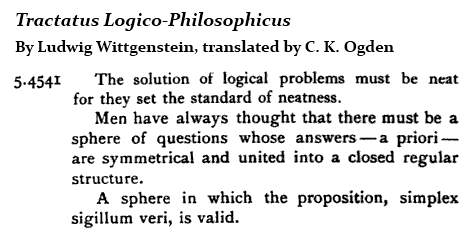
Related material, found during a further search—
A commentary on "simplex sigillum veri" leads to the phrase "adamantine crystalline structure of logic"—

For related metaphors, see The Diamond Cube, Design Cube 2x2x2, and A Simple Reflection Group of Order 168.
Here Łukasiewicz's phrase "the hardest of materials" apparently suggested the commentators' adjective "adamantine." The word "diamond" in the links above refers of course not to a material, but to a geometric form, the equiangular rhombus. For a connection of this sort of geometry with logic, see The Diamond Theorem and The Geometry of Logic.
For more about God, a Stone, logic, and cubes, see Tale (Nov. 23).
* 5.4541 in the German original—
Die Lösungen der logischen Probleme müssen einfach sein,
denn sie setzen den Standard der Einfachheit.
Die Menschen haben immer geahnt, dass es
ein Gebiet von Fragen geben müsse, deren Antworten—
a priori—symmetrisch, und zu einem abgeschlossenen,
regelmäßigen Gebilde vereint liegen.
Ein Gebiet, in dem der Satz gilt: simplex sigillum veri.
Here "einfach" means "simple," not "neat," and "Gebiet" means
"area, region, field, realm," not (except metaphorically) "sphere."
A quotation from Robert Lowell in this journal —
From “Epilogue,” in Robert Lowell’s Day by Day , 1977:
The painter’s vision is not a lens,
it trembles to caress the light.
….
All’s misalliance.
Yet why not say what happened?
Pray for the grace of accuracy
Vermeer gave to the sun’s illumination….
Lowell’s stepdaughter published a memoir, Why Not Say What Happened? , on October 19th, 2010.
What happened in this journal on that date was “Savage Logic and the New York Lottery.”
That post includes the quoted rhetorical question
“Is it a genuine demolition of the walls which seem to separate mind from mind…?”
Here is the context of October 19th—
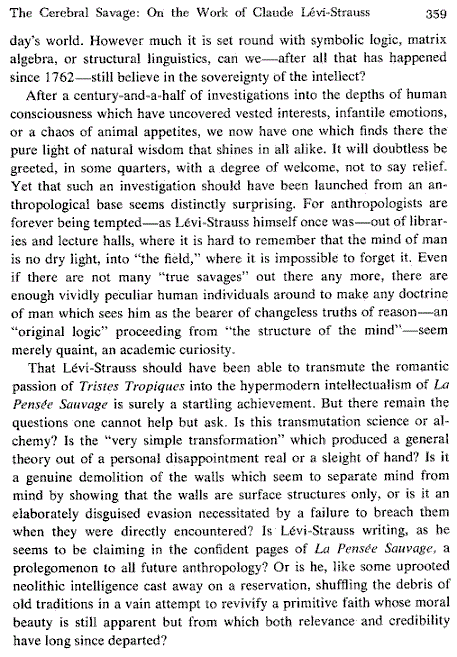
For a different, and to me more interesting, context for the “walls” question, see Party Phone (August 31st, 2006).
From "Deus ex Machina and the Aesthetics of Proof"
(Alan J. Cain in The Mathematical Intelligencer * of September 2010, pdf)—
Deus ex Machina
In a narrative, a deus is unsatisfying for two reasons. The
first is that any future attempt to build tension is undercut if
the author establishes that a difficulty can be resolved by a
deus. The second reason—more important for the purposes
of this essay—is that the deus does not fit with the internal
structure of the story. There is no reason internal to the
story why the deus should intervene at that moment.

Santa in the New York Thanksgiving Day Parade
Thanksgiving Day, 2010 (November 25), New York Lottery—
Midday 411, Evening 332.
For 411, see (for instance) April 11 (i.e., 4/11) in 2008 —
For 332, see "A Play for Kristen**" — March 16, 2008 —
"A search for the evening number, 332, in Log24 yields a rather famous line from Sophocles…"
Sophocles, Antigone, edited by Mark Griffith, Cambridge University Press, 1999:

“Many things are formidable (deina ) and none is more formidable (deinoteron ) than man.”
– Antigone , lines 332-333, in Valdis Leinieks, The Plays of Sophokles, John Benjamins Publishing Company, 1982, p. 62
See also the lottery numbers 411 and 332 in this journal on March 22, 2009— "The Storyteller in Chance ."
“… it’s going to be accomplished in steps,
this establishment of the Talented
in the scheme of things.”
— Anne McCaffrey, Radcliffe ’47, To Ride Pegasus
* It seems Santa has delivered an early gift — free online access to all issues of the Intelligencer .
** Teaser headline in the original version at Xanga.com
"An image comes to mind of a white, ideal space
that, more than any single picture, may be
the archetypal image of 20th-century art."
"May be" —
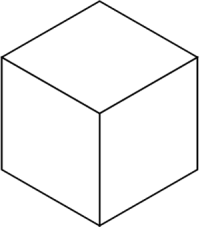
Image from this journal
at noon (EST) Tuesday
"The geometry of unit cubes is a meeting point
of several different subjects in mathematics."
— Chuanming Zong
"A meeting point" —

The above death reportedly occurred "early Wednesday in Beijing."
Another meeting point —
(Click on logo and on meeting image for more details.)
See also "no ordinary venue."
From a post on the morning of November 22 —
Steve Martin on his character Ray Porter in the novella Shopgirl (published Oct. 11, 2000)—
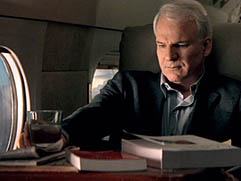
"He said, 'I wrote a piece of code
that they just can’t seem to do without.'
He was a symbolic logician. That was his career…."
From more recent entertainment news — the new Disney film Tangled , and a related image—
This one ain't no shopgirl, Ray.
Related material — This journal on the date of the above Guardian story.
A reviewer says Steve Martin finds in his new novel An Object of Beauty "a sardonic morality tale."
From this journal on the day The Cube was published (see today's Art Object ) —
Monday February 20, 2006
|
See also a post on Mathematics and Narrative from Nov. 14, 2009.
That post compares characters in Many Dimensions to those in Logicomix—
There is more than one way
to look at a cube.

From Cambridge U. Press on Feb. 20, 2006 —
and from this journal on June 30, 2010 —
In memory of Wu Guanzhong, Chinese artist
who died in Beijing on June 25, 2010 —
See also this journal on Feb. 20, 2006
(the day The Cube was published).
Recent posts (Church Logic and Church Narrative) have discussed finite geometry as a type of non-Euclidean geometry.
For those who prefer non-finite geometry, here are some observations.
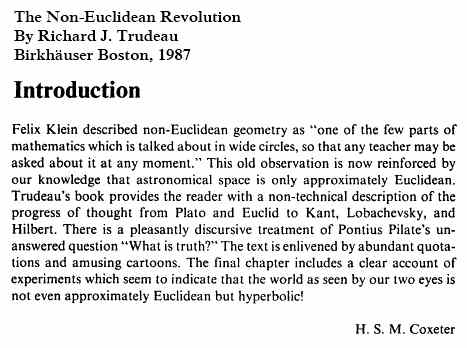
"A characteristic property of hyperbolic geometry
is that the angles of a triangle add to less
than a straight angle (half circle)." — Wikipedia

From To Ride Pegasus, by Anne McCaffrey, 1973:
“Mary-Molly luv, it’s going to be accomplished in steps, this establishment of the Talented in the scheme of things. Not society, mind you, for we’re the original nonconformists…. and Society will never permit us to integrate. That’s okay!” He consigned Society to insignificance with a flick of his fingers. “The Talented form their own society and that’s as it should be: birds of a feather. No, not birds. Winged horses! Ha! Yes, indeed. Pegasus… the poetic winged horse of flights of fancy. A bloody good symbol for us. You’d see a lot from the back of a winged horse…”
“Yes, an airplane has blind spots. Where would you put a saddle?” Molly had her practical side.
On the practical side:

The above chapel is from a Princeton Weekly Bulletin story of October 6th, 2008.
Related material: This journal on that date.
Steve Martin’s new novel An Object of Beauty will be released tomorrow.
“The most charmingly rendered female schemer since Truman Capote’s Holly Golightly.”
— Elle magazine
“Martin compresses the wild and crazy end of the millennium
and finds in this piercing novel a sardonic morality tale….
Exposes the sound and fury of the rarified Manhattan art world.”
— Publishers Weekly
“Like Steve Martin’s Shopgirl , this very different novel will captivate your attention from start to finish.”
— Joyce Carol Oates
Martin on his character Ray Porter in the novella Shopgirl (published Oct. 11, 2000)—

“He said, ‘I wrote a piece of code
that they just can’t seem to do without.’
He was a symbolic logician. That was his career….”
As the above review notes, Martin’s new book is about art at the end of the millennium.
See also Art Wars: Geometry as Conceptual Art
and some of my own notes from 2000 (March 9) in “Is Nothing Sacred?”
Some related material —
A paperback with a striking cover (artist unknown)—

Note that the background may be constructed from
any of four distinct motifs. For another approach to these
motifs in a philosophical context, see June 8, 2010.
“Visual forms— lines, colors, proportions, etc.— are just as capable of articulation , i.e. of complex combination, as words. But the laws that govern this sort of articulation are altogether different from the laws of syntax that govern language. The most radical difference is that visual forms are not discursive . They do not present their constituents successively, but simultaneously, so the relations determining a visual structure are grasped in one act of vision.”
– Susanne K. Langer, Philosophy in a New Key
For Dan Brown fans—
Today's midday New York Lottery number was 438.
See page 438 of Heinlein's The Number of the Beast (Fawcett paperback, 1980),
on "ultimate total philosophy."
Other philosophy —
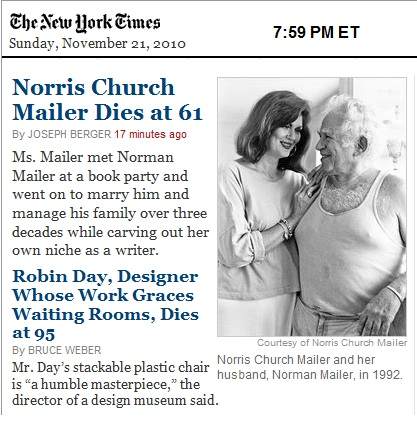
Today's evening New York Lottery number was 772.
See Cheap Diamonds , by Norris Church Mailer, and the symbol
coded (on at least some keyboards) by "Alt 772"—

Alt 772 = ♦
See also Wallace Stevens's "Crude Foyer" in this journal on June 24, 2008 —
the day Cheap Diamonds was published in paperback.
For fans of Ian Watson's The Embedding , a miglior fabbro — C. S. Lewis on Charles Williams.
This is apparently a brief excerpt from an audio book, "C. S. Lewis Speaks His Mind."
A printed version of Lewis's remarks on Williams, "The Novels of Charles Williams," appears on pages 21-27 of On Stories: And Other Essays on Literature by C. S. Lewis (Houghton Mifflin Harcourt paperback, 2002 reprint of a book first published in 1982, edited and with a preface by Walter Hooper).
From the preface—
"'The Novels of Charles Williams' was written at the request of the British Broadcasting Corporation, and Lewis read it over the Third Programme of the BBC on the 11th February 1949. It has never been published before and, indeed, had lain undetected in the BBC Written Archives until I came across it quite by accident in 1980."
Excerpts from a book review titled …
"Saul Bellow’s Quest for the Vernacular Sublime"
“We often stopped before a display of children’s shoes. My mother coveted for me a pair of patent-leather sandals with an elegantissimo strap. I finally got them— I rubbed them with butter to preserve the leather. This is when I was 6 or 7 years old, a little older than Rosie is now. Amazing how it all boils down to a pair of patent-leather sandals.” recorded that ancient memory, stirred to it by play with his little daughter, in a letter on Feb. 19, 2004, when he was 88 years old. It is the last letter in this magnificent book…."
"… Finally he was— may this, too, be said without irony?— a seeker after truth."
— Leon Wieseltier in the November 21 New York Times Sunday Book Review
Without irony is fine, but don't forget the sandals.
An Epic Search for Truth
— Subtitle of Logicomix , a work reviewed in the December 2010 Notices of the American Mathematical Society (see previous post).
Some future historian of mathematics may contrast the lurid cover of the December 2010 Notices
Excerpts from Logicomix
with the 1979 cover found in a somewhat less epic search —

Larger view of Google snippet —

For some purely mathematical background, see Finite Geometry of the Square and Cube.
For some background related to searches for truth, see "Coxeter + Trudeau" in this journal.
"It's my absolute ambition that you are touched to the core of your being with the content…."
— Julie Taymor on Spider-Man: Turn Off the Dark (Playbill video, undated)
Another ambitious comic-book promotion —
"What Logicomix does that few works in any medium do is to make intellectual passion palpable. That is its greatest strength. And it’s here that its form becomes its substance."
— Judith Roitman, review (pdf, 3.7 MB) of Logicomix: An Epic Search for Truth , in …

The December 2010 AMS Notices cover has excerpts from Logicomix.
Related material:
"In the classical grammarians’ sense of the power of form over 'content' and style over 'substance,' he originated the phrase, 'the medium is the message.'"
— Joseph P. Duggan on Marshall McLuhan at The University Bookman
See also, in this journal, The Medium is the Message, Wechsler, and Blockheads .
Peter Woit has a post on Scientific American 's new Garrett Lisi article, "A Geometric Theory of Everything."
The Scientific American subtitle is "Deep down, the particles and forces of the universe are a manifestation of exquisite geometry."
See also Rhetoric (Nov. 4, 2010) and Exquisite Geometries (May 19, 2009).
Thanks to David Lavery for the following dialogue on the word "narrative" in politics—
"It's like – does this fit into narrative?
It's like, wait, wait, what about a platform? What about, like, ideas?
What about, you know, these truths we hold to be self-evident?
No, it's the narrative."
"Is narrative a fancy word for spin?"
Related material —
Church Logic (Log24, October 29) —
What sort of geometry
is the following?
"What about, you know, these truths we hold to be self-evident?"
Some background from Cambridge University Press in 1976 —

Commentary —
The Church Logic post argues that Cameron's implicit definition of "non-Euclidean" is incorrect.
The four-point, six-line geometry has as lines "all subsets of the point set" which have cardinality 2.
It clearly satisfies Euclid's parallel postulate. Is it, then, not non-Euclidean?
That would, according to the principle of the excluded middle (cf. Church), make it Euclidean.
A definition from Wikipedia that is still essentially the same as it was when written on July 14, 2003—
"Finite geometry describes any geometric system that has only a finite number of points. Euclidean geometry, for example, is not finite, because a Euclidean line contains infinitely many points…."
This definition would seem to imply that a finite geometry (such as the four-point geometry above) should be called non -Euclidean whether or not it violates Euclid's parallel postulate. (The definition's author, unlike many at Wikipedia, is not anonymous.)
See also the rest of Little Gidding.
Cover art by Giorgio Morandi—
Still Life , 1953,
The Phillips Collection, Washington, DC
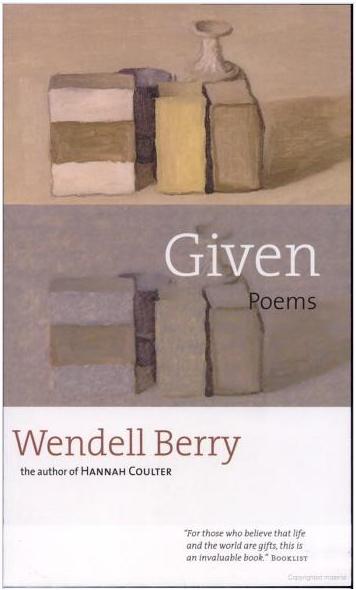
Thanks to A Circle of Quiet for pointing out this cover.

Detail from Google logo of Nov. 13, 2010
Related material: After Eden and Voyage of the Dawn Treader.
From the December 2010 American Mathematical Society Notices—

Related material from this journal—
Consolation Prize (August 19, 2010)

Related material suggested by last evening's NY lottery number 098—
Fear and Loathing in the Realm of the Mothers and Tarantella.
See also some notes on philosophy found yesterday afternoon.
In memory of film producer Dino De Laurentiis, who died yesterday at 91—
He is listed in Internet Movie Database under “Three Days of the Condor” as “executive producer (uncredited).”
At the end of that film, Cliff Robertson asks Robert Redford, “How do you know they’ll print it?”
One possible answer—

An interpretation for the philosophers of the Times —
See “these rich pages (586-589)” in Husserliana XV—
Zur Phänomenologie der Intersubjektivität.
Texte aus dem Nachlass. Dritter Teil: 1929-1935.
Hrsg. von Iso Kern. 1973. lxx + 742 pp.
HB. ISBN 90-247-5030-X
For related material by the author of the above phrase “these rich pages,” see “Phenomenological Time: Its Religious Significance,” by James G. Hart (pp. 17-45 in a book with the unusually ambitious title Religion and Time ).
A description in Pynchon's Against the Day of William Rowan Hamilton's October 16th, 1843, discovery of quaterions—
"The moment, of course, is timeless. No beginning, no end, no duration, the light in eternal descent, not the result of conscious thought but fallen onto Hamilton, if not from some Divine source then at least when the watchdogs of Victorian pessimism were sleeping too soundly to sense, much less frighten off, the watchful scavengers of Epiphany."
New York Lottery yesterday, on Hermann Weyl's birthday— Midday 106, Evening 865.
Here 106 suggests 1/06, the date of Epiphany, and 865 turns out to be the title number of Weyl's Symmetry at Princeton University Press—
http://press.princeton.edu/titles/865.html.
Symmetry and quaternions are, of course, closely related.
A Theory of Pure Design
by Denman Waldo Ross
Lecturer on the Theory of Design
in Harvard University
Boston and New York
Houghton, Mifflin and Company, 1907
PREFACE
"My purpose in this book is to elucidate, so far as I can, the
principles which underlie the practice of drawing and painting
as a Fine Art. Art is generally regarded as the expression of
feelings and emotions which have no explanation except per-
haps in such a word as inspiration , which is expletive rather
than explanatory. Art is regarded as the one activity of man
which has no scientific basis, and the appreciation of Art is
said to be a matter of taste in which no two persons can be
expected to agree. It is my purpose in this book to show how,
in the practice of Art, as in all other practices, we use certain
terms and follow certain principles. Being defined and ex-
plained, these terms and principles may be known and under-
stood by everybody. They are, so to speak, the form of the
language.
While an understanding of the terms and principles of Art
will not, in itself, enable any one to produce important works,
such works are not produced without it. It must be understood,
however, that the understanding of terms and principles
is not, necessarily, an understanding in words. It may lie in
technical processes and in visual images and may never rise,
or shall I say fall, to any formulation in words, either spoken
or written."
_________________________________________________
One of Ross's protégés, Jack Levine, died yesterday at 95. He
is said to have remarked, "I want to paint with the dead ones."
Related material: This journal on the day of Levine's death
and on the day of Martin Gardner's death.
The latter post has an image illustrating Ross's remarks on
formulations in words—
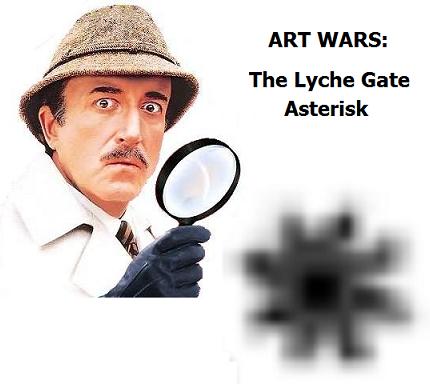
For further details, see Finale, Darkness Visible, and Packed.
"You ain't been blue; no, no, no.
You ain't been blue,
Till you've had that mood_indigo."
–Indigo (web color) (#4B0082)
"This pigment (web color #4B0082) represents
the way the color_indigo was always reproduced
in pigments, paints, or colored pencils in the 1950s."
For related mythology, see indigo.
See also a search for "Coltrane + telepathic."
Today's previous entry discussed a musical offering by Coltrane, with a link to some spiritual background on a mathematician from India who died on October 16, 1983. Here is a pictorial offering, more in the spirit of Bach than of Coltrane, from the day of that death—
Click on the image for some context.
Yesterday's New York Lottery: Midday 069, Evening 885.
This, together with a Log24 post for October 16, 2007, suggests the following musical offering:
Click for a larger and clearer image.
Continued from July 26, 2010 —
Sicut aquila provocans ad volandum pullos suos,
et super eos volitans, expandit alas suas,
et assumpsit eum, atque portavit in humeris suis.
— Deuteronomy 32:11 (Clementine Latin Vulgate)
Continued from June 4, 2010

See also Jon Han's fanciful illustration in today's New York Times and "Galois Cube" in this journal.
Hollywood Reporter Exclusive
Martin Sheen Caught in
Spider-Man's Web
Sally Field is in early talks
to play Aunt May.
Related material:
Birthdays in this journal,
Galois Field of Dreams,
and Class of 64.
This morning's post mentioned the new film "Black Swan," starring Natalie Portman, that opens December 3.
Portman also starred in the 2006 film "V for Vendetta," based very loosely on today's date— November 5, Guy Fawkes Day.
Some background on Alan Moore, the creator of the graphic novel underlying that film—
1. The New York Times , March 12, 2006
2. Panelling Parallax: The Fearful Symmetry of William Blake and Alan Moore
3. This journal on March 24, 2009
Also from March 24, 2009— An image for what Thomas Pynchon, in this morning's post, called "the watchful scavengers of Epiphany."
From last night's post—
"… right now…. winning the day…."
— President Obama on the 16th of October (between 5:19 and 5:37 PM EDT)
This journal on the 16th of October—
Saturday, October 16, 2010Quaternion DayBrightness at Noon continued – Sir William Rowan Hamilton, Oct. 16, 1843 See also this journal on 1/09, 2010. |
Related religious material from Thomas Pynchon—

* Material related to this post's title, "Seize the Day"—
Indirectly related — an ad for the new film Black Swan
accompanying a Halloween story in yesterday's online New York Times —
More directly related —
Black Swan Theory at Wikipedia —
"Is our children learning?"
— George W. Bush, January 11, 2000 (according to TIME)
"… our politics seems so tough right now, and
facts and science and argument does not seem to be winning the day…."
— Barack Obama, October 16, 2010 (according to whitehouse.gov)
The same Obama quotation appeared in The New York Times.
Related material on facts and science and argument —
"If you’re interested in particle physics and not regularly reading
Tommaso Dorigo’s blog, you should be."
— Peter Woit at Not Even Wrong , March 21, 2009
Click on the above for further details.
See also Plotting Obama's Passage to India (AP)
Tangled Up In Red
| CHANGE FEW CAN BELIEVE IN |
See Siri Hustvedt on the name "Wechsler"
and see the tag "permutahedron" in this journal.
For Tom Hanks

and Kristin Davis

__________________________________________
Interpretations
"And the lotos rose, quietly, quietly,
The surface glittered out of heart of light"
__________________________________________
Background

Malcolm Lowry, author of
Under the Volcano
|
Mirror Ball album
Hey ho away we go |
Mirror Ball album
Yeah you're working |
Hotel Bella Vista
Gran Baile Noviembre 1938
a Beneficio de la Cruz Roja.
Los Mejores Artistas del radio en accion.
No falte Vd.
24 graphic patterns arranged in space
as 12 pairs of opposites
Click image for an illustration of how the above labeling was derived.
For further background, see Cases of the Diamond Theorem
and recent art by Josefine Lyche of Norway.
A Year of Magical Thinking
In memory of Theodore Chaikin Sorensen, who died at noon in New York on Halloween —
Two posts from All Saints' Day, 2009 —
October Endgame and Indignation and Laughter in Toronto.
Related material: New York Lottery on All Hallows' Eve this year —
Midday 896, Evening 384.
"Man is a system that transforms itself." (Paul Valéry, Cahiers , Vol. 2, page 896)
"There is such a thing as a tesseract." (Madeleine L'Engle. See 384 on Halloween 2006.)
Powered by WordPress